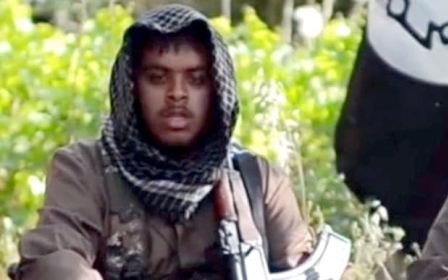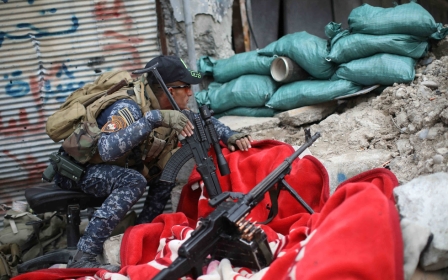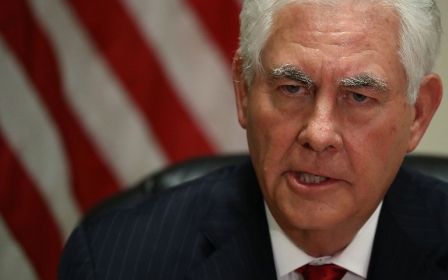Flight of IS fighters from Syria to Turkey raises security concerns

The arrest by Turkish police of several western nationals suspected of fighting for the Islamic State (IS) has raised concerns that others will attempt to flee and return to Europe as the group continues to lose territory in Syria.
Turkish and European authorities have said that in the last few months, there has been an increase in foreign fighters attempting to leave Syria and Iraq.
Last week, Kary Paul Kleman from Florida, Stefan Aristidou from North London and his British wife, surrendered to Turkish border police in Kilis after more than two years of living in areas controlled by IS, according to the Guardian newspaper.
Police in South Turkey have apprehended dozens of IS foreign fighters, many of whom have either handed themselves to the Turkish authorities or been caught attempting to cross the border illegally.
Officials told the Guardian that Aristidou had confessed to living in Raqqa and al-Bab, both of which had been IS strongholds until Turkish-backed Syrian opposition forces recaptured al-Bab.
They also said that Aristidou who came to the Turkish border with his British wife, who is of Bangladeshi heritage, had told border guards that he had travelled to Syria to settle rather than fight.
Kleman who is a US national had arrived at the Turkish border with a Syrian wife, and two Egyptian women, whose spouses had been killed in Syria or Iraq, Turkish officials said.
His family claimed that Kleman had travelled to Syria with his family in the summer of 2015 to help with delivering aid inside Syria.
After arriving in Syria, however, the US national's mother said he realised that the information that brought him to Syria, "was all a scam".
Ongoing issue
A source, who did not want to be identified, with knowledge of the situation along the Syrian-Turkish border told Middle East Eye there had always been routes in and out of Syria that were used for smuggling cigarettes and other contraband that had also been used by people trying to leave.
But the main routes were now tightly controlled by the Turkish army and other routes were regularly shut down. "One day there is and the next day it closes. But there's always ways around it. Wherever there is a poorly paid military there is always a way."
Raffaello Pantucci, a counter-terrorism expert at the Royal United Services Institute (RUSI) told MEE that desertions by "foreign fighters have been ongoing for a long time".
He also highlighted the increased workload an influx of returnees will give to European security services saying that it will require a "great deal of work and coordination".
Many foreign fighters who have previously returned back to Europe from Syria have either been incarcerated or placed in government programmes to determine whether they are a threat to that country's national security.
In Britain, the police and Crown Prosecution Service decide whether to prosecute returnees on a case by case basis.
Aristidou could face charges if he is extradited back to the UK. Any UK national who is arrested for fighting with the IS may face charges under the terrorism act, which carries a maximum penalty of life imprisonment.
Challenges ahead
Governments in Europe are expected to face a number of challenges with foreign fighters who fought for IS returning.
Shiraz Maher from the International Centre for the Study of Radicalisation at King's College London said that European courts "will need to deal with people who have perpetrated war crimes as the law is not clear cut."
"Governments will face the prospect of highly trained operatives who have bomb-making experience with the capacity to pull off deadly attacks and fighters suffering from combat distress like PTSD [post-traumatic stress disorder], due to the nature of crimes perpetrated by ISIS."
He also added: "Governments will have to grapple with the moral and legal issue of children who were born in ISIS territory and whether they would be granted asylum."
Insiders within IS have told the Guardian that the group's ranks have been hollowed out following months of fierce battles that have led to the loss of its territory.
Nearly a fifth of IS militants were residents or nationals from Western Europe, with an estimated 1,200 people travelling from France.
US authorities estimate that around 30,000 foreign fighters have crossed into Syria to fight with IS, where many have been killed by airstrikes from the US-led coalition.
The top five countries where foreign fighters from IS come from include Tunisia, Saudi Arabia, Russia, Turkey and Jordan.
This article is available in French on Middle East Eye French edition.
New MEE newsletter: Jerusalem Dispatch
Sign up to get the latest insights and analysis on Israel-Palestine, alongside Turkey Unpacked and other MEE newsletters
Middle East Eye delivers independent and unrivalled coverage and analysis of the Middle East, North Africa and beyond. To learn more about republishing this content and the associated fees, please fill out this form. More about MEE can be found here.




